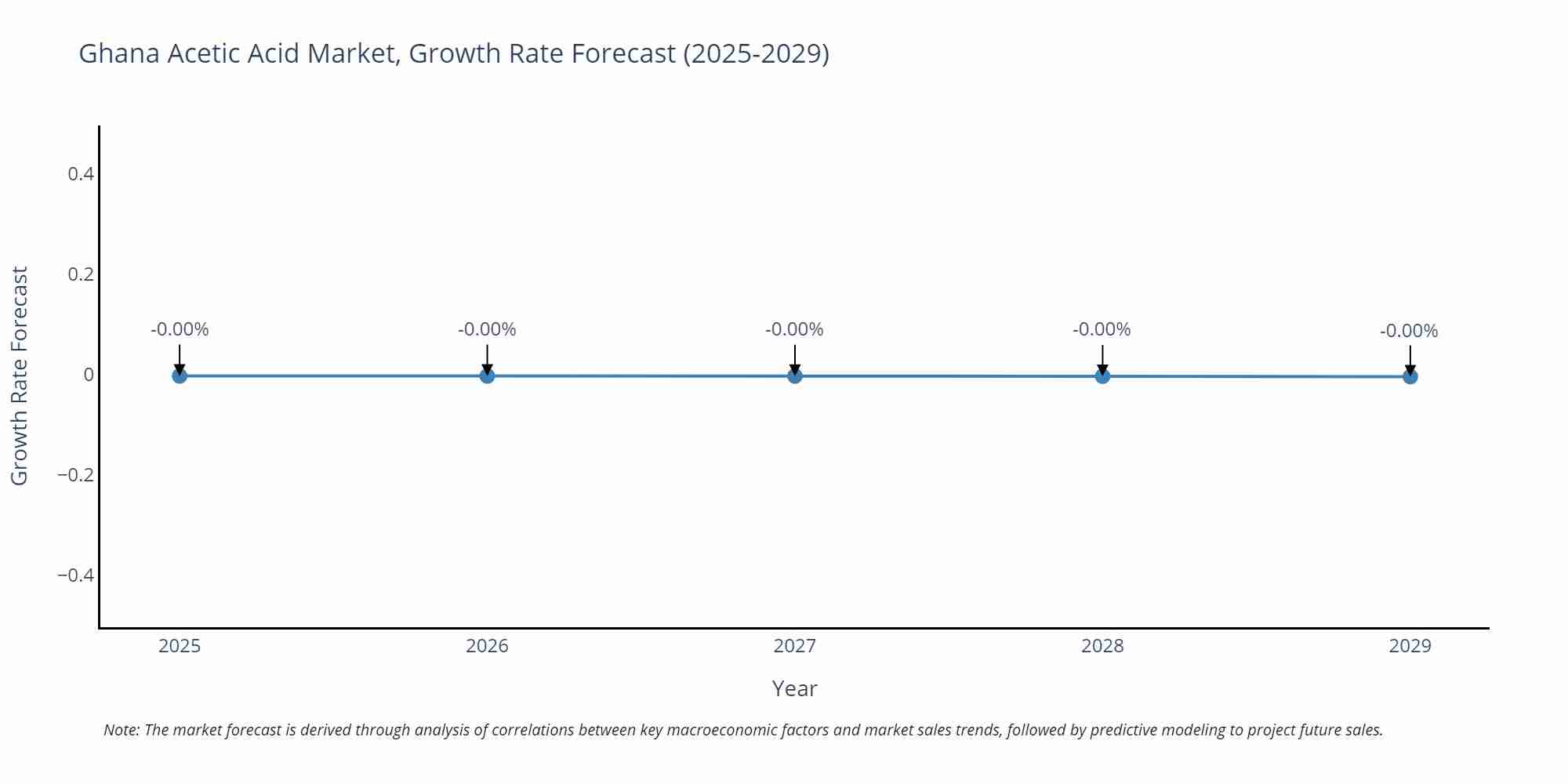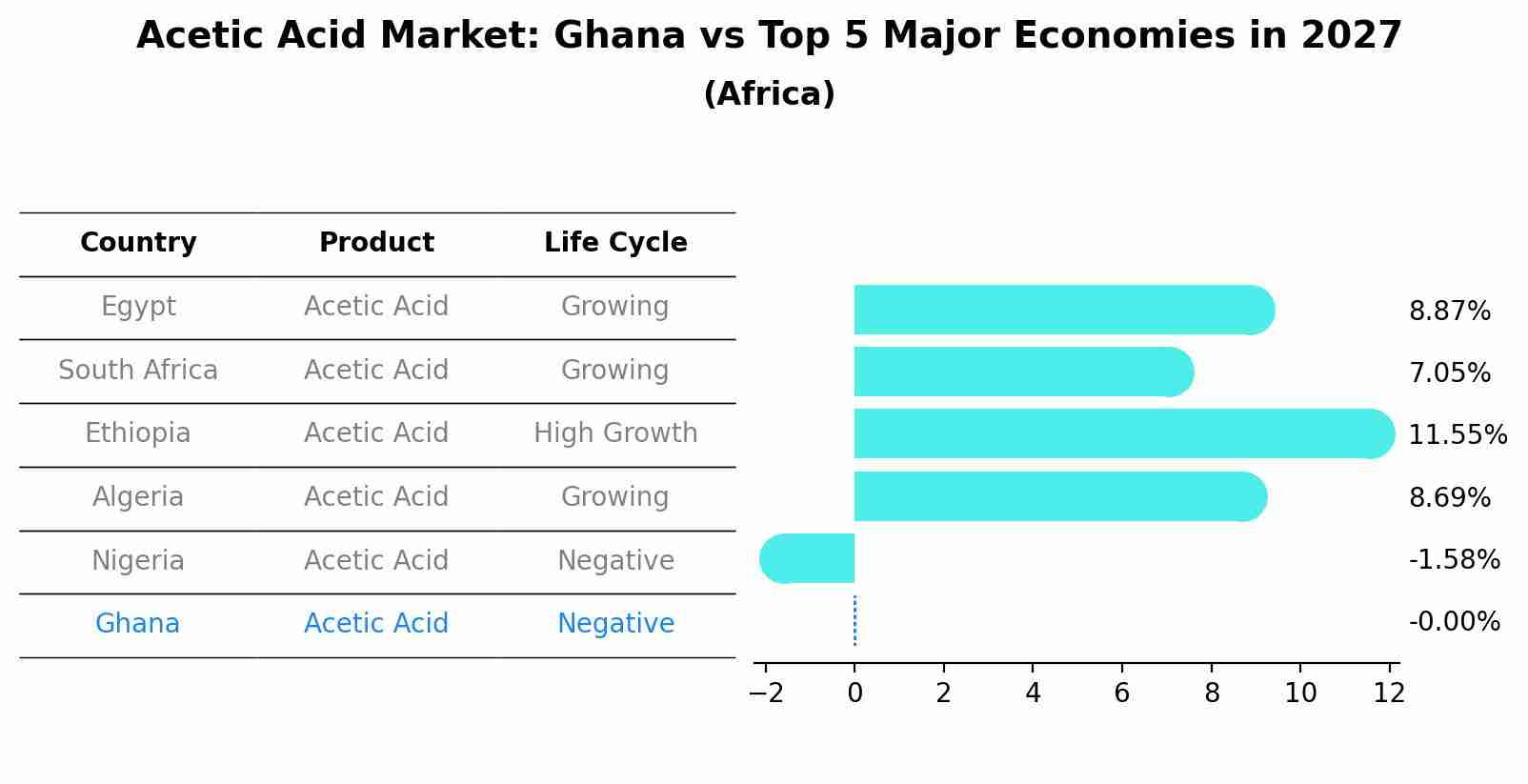Ghana Acetic Acid Market (2025-2031) Outlook | Size, Value, Revenue, Share, Forecast, Industry, Trends, Companies, Growth & Analysis
| Product Code: ETC411772 | Publication Date: Oct 2022 | Updated Date: Jul 2025 | Product Type: Market Research Report | |
| Publisher: 6Wresearch | Author: Sachin Kumar Rai | No. of Pages: 75 | No. of Figures: 35 | No. of Tables: 20 |
Ghana Acetic Acid Market Size Growth Rate
The Ghana Acetic Acid Market may undergo a gradual slowdown in growth rates between 2025 and 2029. Beginning strongly at -0.00% in 2025, growth softens to -0.00% in 2029.

Acetic Acid Market: Ghana vs Top 5 Major Economies in 2027 (Africa)
By 2027, the Acetic Acid market in Ghana is anticipated to reach a growth rate of -0.00%, as part of an increasingly competitive Africa region, where Egypt remains at the forefront, supported by South Africa, Ethiopia, Algeria and Nigeria, driving innovations and market adoption across sectors.

Ghana Acetic Acid Market Synopsis
The Ghanaian acetic acid market is experiencing steady growth driven by its diverse industrial applications. As a key chemical compound used in industries such as food and beverage, pharmaceuticals, textiles, and chemical manufacturing, acetic acid demand in Ghana is primarily fueled by the expanding manufacturing sector. The country`s growing population and increasing urbanization also contribute to the rising consumption of acetic acid in various end-use industries. Additionally, the government`s focus on industrialization and infrastructure development further supports the demand for acetic acid in the country. Local manufacturers, as well as multinational companies, play a significant role in supplying acetic acid to meet the market requirements in Ghana, with a focus on maintaining high product quality and competitive pricing to sustain market growth.
Ghana Acetic Acid Market Trends
The Ghana Acetic Acid Market is experiencing steady growth due to rising demand from various end-use industries such as food and beverage, pharmaceuticals, and textiles. The market is witnessing a shift towards eco-friendly and sustainable production practices, with an increasing focus on bio-based acetic acid derived from renewable sources. There is also a growing emphasis on product innovation and development of high-quality acetic acid grades to meet the diverse requirements of different industries. Additionally, the market is seeing a rise in investments in research and development activities to enhance product efficiency and application versatility. Overall, the Ghana Acetic Acid Market is poised for continuous expansion driven by evolving consumer preferences, technological advancements, and regulatory initiatives promoting sustainable practices.
Ghana Acetic Acid Market Challenges
In the Ghanaian Acetic Acid market, some key challenges include fluctuating raw material prices, limited local production capacity, and competition from imported products. The volatility of feedstock prices, such as methanol and carbon monoxide, can impact the overall production costs for companies in the market. Additionally, the country currently has limited domestic production capacity for acetic acid, leading to a reliance on imports to meet demand. This dependence on imported products can be a challenge due to fluctuations in international prices and exchange rates. Furthermore, competition from foreign suppliers, particularly those offering lower-priced alternatives, poses a threat to local producers in the Ghanaian market. Overall, addressing these challenges will require strategic planning, investment in production capabilities, and efforts to enhance competitiveness in the market.
Ghana Acetic Acid Market Investment Opportunities
The Ghana acetic acid market presents promising investment opportunities due to the growing demand for the chemical in various industries such as food and beverage, pharmaceutical, textiles, and chemicals. With the country`s expanding manufacturing sector and increasing focus on industrialization, there is a steady need for acetic acid as a key raw material in the production of a wide range of products. Investors can consider opportunities in establishing manufacturing facilities for acetic acid production or partnering with existing local producers to expand their operations. Additionally, investing in distribution and supply chain infrastructure to ensure efficient transportation and delivery of acetic acid to end-users can also be a lucrative venture in the Ghanaian market.
Jordan Agar Market Government Policies
In Ghana, government policies related to the Acetic Acid Market primarily focus on promoting a conducive business environment for domestic production and reducing dependence on imports. The government has implemented measures to support local manufacturers through initiatives such as tax incentives, subsidies, and investment promotion programs. Additionally, regulations are in place to ensure product quality standards and environmental sustainability in the production and distribution of acetic acid. The government also aims to foster innovation and research in the sector to enhance competitiveness and increase exports. Overall, Ghana`s policies aim to stimulate growth in the Acetic Acid Market, create employment opportunities, and contribute to the country`s economic development.
Ghana Acetic Acid Market Future Outlook
The Ghana Acetic Acid market is poised for steady growth in the coming years, driven by increasing industrial applications and a growing consumer base. Factors such as the rising demand for products like paints, coatings, and adhesives, as well as the expanding food and beverage industry, will contribute to the market`s positive outlook. Additionally, the government`s focus on promoting industrialization and attracting foreign investments is expected to further boost the demand for acetic acid in various sectors. With a favorable business environment and increasing awareness about the benefits of acetic acid in different applications, the market is likely to witness sustained growth and opportunities for both domestic and international players in the near future.
Key Highlights of the Report:
- Ghana Acetic Acid Market Outlook
- Market Size of Ghana Acetic Acid Market, 2024
- Forecast of Ghana Acetic Acid Market, 2031
- Historical Data and Forecast of Ghana Acetic Acid Revenues & Volume for the Period 2021 - 2031
- Ghana Acetic Acid Market Trend Evolution
- Ghana Acetic Acid Market Drivers and Challenges
- Ghana Acetic Acid Price Trends
- Ghana Acetic Acid Porter's Five Forces
- Ghana Acetic Acid Industry Life Cycle
- Historical Data and Forecast of Ghana Acetic Acid Market Revenues & Volume By Application for the Period 2021 - 2031
- Historical Data and Forecast of Ghana Acetic Acid Market Revenues & Volume By Vinyl Acetate Monomer for the Period 2021 - 2031
- Historical Data and Forecast of Ghana Acetic Acid Market Revenues & Volume By Acetic Anhydride for the Period 2021 - 2031
- Historical Data and Forecast of Ghana Acetic Acid Market Revenues & Volume By Acetate Esters for the Period 2021 - 2031
- Historical Data and Forecast of Ghana Acetic Acid Market Revenues & Volume By Purified Terephthalic Acid for the Period 2021 - 2031
- Historical Data and Forecast of Ghana Acetic Acid Market Revenues & Volume By Ethanol for the Period 2021 - 2031
- Historical Data and Forecast of Ghana Acetic Acid Market Revenues & Volume By Others for the Period 2021 - 2031
- Ghana Acetic Acid Import Export Trade Statistics
- Market Opportunity Assessment By Application
- Ghana Acetic Acid Top Companies Market Share
- Ghana Acetic Acid Competitive Benchmarking By Technical and Operational Parameters
- Ghana Acetic Acid Company Profiles
- Ghana Acetic Acid Key Strategic Recommendations
Frequently Asked Questions About the Market Study (FAQs):
- Single User License$ 1,995
- Department License$ 2,400
- Site License$ 3,120
- Global License$ 3,795
Search
Related Reports
- ASEAN Bearings Market (2025-2031) | Strategy, Consumer Insights, Analysis, Investment Trends, Opportunities, Growth, Size, Share, Industry, Revenue, Segments, Value, Segmentation, Supply, Forecast, Restraints, Outlook, Competition, Drivers, Trends, Demand, Pricing Analysis, Competitive, Strategic Insights, Companies, Challenges
- Europe Flooring Market (2025-2031) | Outlook, Share, Industry, Trends, Forecast, Companies, Revenue, Size, Analysis, Growth & Value
- Saudi Arabia Manlift Market (2025-2031) | Outlook, Size, Growth, Trends, Companies, Industry, Revenue, Value, Share, Forecast & Analysis
- Uganda Excavator, Crane, and Wheel Loaders Market (2025-2031) | Strategy, Consumer Insights, Analysis, Investment Trends, Opportunities, Growth, Size, Share, Industry, Revenue, Segments, Value, Segmentation, Supply, Forecast, Restraints, Outlook, Competition, Drivers, Trends, Demand, Pricing Analysis, Competitive, Strategic Insights, Companies, Challenges
- Rwanda Excavator, Crane, and Wheel Loaders Market (2025-2031) | Strategy, Consumer Insights, Analysis, Investment Trends, Opportunities, Growth, Size, Share, Industry, Revenue, Segments, Value, Segmentation, Supply, Forecast, Restraints, Outlook, Competition, Drivers, Trends, Demand, Pricing Analysis, Competitive, Strategic Insights, Companies, Challenges
- Kenya Excavator, Crane, and Wheel Loaders Market (2025-2031) | Strategy, Consumer Insights, Analysis, Investment Trends, Opportunities, Growth, Size, Share, Industry, Revenue, Segments, Value, Segmentation, Supply, Forecast, Restraints, Outlook, Competition, Drivers, Trends, Demand, Pricing Analysis, Competitive, Strategic Insights, Companies, Challenges
- Angola Excavator, Crane, and Wheel Loaders Market (2025-2031) | Strategy, Consumer Insights, Analysis, Investment Trends, Opportunities, Growth, Size, Share, Industry, Revenue, Segments, Value, Segmentation, Supply, Forecast, Restraints, Outlook, Competition, Drivers, Trends, Demand, Pricing Analysis, Competitive, Strategic Insights, Companies, Challenges
- Israel Intelligent Transport System Market (2025-2031) | Strategy, Consumer Insights, Analysis, Investment Trends, Opportunities, Growth, Size, Share, Industry, Revenue, Segments, Value, Segmentation, Supply, Forecast, Restraints, Outlook, Competition, Drivers, Trends, Demand, Pricing Analysis, Competitive, Strategic Insights, Companies, Challenges
- Uganda Precast and Aggregate Market (2025-2031) | Strategy, Consumer Insights, Analysis, Investment Trends, Opportunities, Growth, Size, Share, Industry, Revenue, Segments, Value, Segmentation, Supply, Forecast, Restraints, Outlook, Competition, Drivers, Trends, Demand, Pricing Analysis, Competitive, Strategic Insights, Companies, Challenges
- Australia IT Asset Disposal Market (2025-2031) | Strategy, Consumer Insights, Analysis, Investment Trends, Opportunities, Growth, Size, Share, Industry, Revenue, Segments, Value, Segmentation, Supply, Forecast, Restraints, Outlook, Competition, Drivers, Trends, Demand, Pricing Analysis, Competitive, Strategic Insights, Companies, Challenges
Industry Events and Analyst Meet
Our Clients
Whitepaper
- Middle East & Africa Commercial Security Market Click here to view more.
- Middle East & Africa Fire Safety Systems & Equipment Market Click here to view more.
- GCC Drone Market Click here to view more.
- Middle East Lighting Fixture Market Click here to view more.
- GCC Physical & Perimeter Security Market Click here to view more.
6WResearch In News
- Doha a strategic location for EV manufacturing hub: IPA Qatar
- Demand for luxury TVs surging in the GCC, says Samsung
- Empowering Growth: The Thriving Journey of Bangladesh’s Cable Industry
- Demand for luxury TVs surging in the GCC, says Samsung
- Video call with a traditional healer? Once unthinkable, it’s now common in South Africa
- Intelligent Buildings To Smooth GCC’s Path To Net Zero













